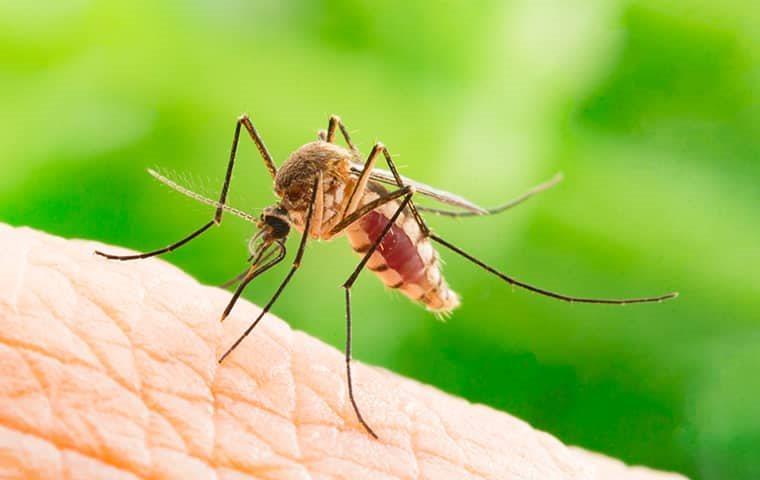The mosquito is widely considered to be the most dangerous creature on earth. They spread dangerous, deadly, or debilitating diseases and parasites to humans all over the world.
Description Of The Mosquito
The average mosquito is about ¼ inch long and has a slender body and six long legs. The clear wings have scales on the veins, as does the body. The first thing you notice about the head is the long, slender mouthparts, but they also have compound eyes and slender antennas. The color of the mosquito varies by species but is generally dark. The Asian tiger mosquito is black with white stripes. It is an invasive mosquito species in Dallas but has naturalized in this area.
Health Issues
Mosquitoes spread diseases that can kill humans, horses, dogs, and cats. These include Zika virus, malaria, West Nile virus, dengue, chikungunya, yellow fever, encephalitis, tularemia, and dog heartworms (which occasionally infect cats). Not all of these diseases are currently present in the area, but anyone traveling may encounter them.
Lifecycle Of The Mosquito
Understanding how to reduce mosquito problems requires understanding the mosquito lifecycle. The female must take a blood meal to produce her eggs. “Floodwater mosquitoes” lay eggs on plants at or below the floodwater level or in the soil where it floods. The eggs can wait to hatch for up to two years until a flood comes. “Stillwater mosquitoes” lay rafts of eggs stuck together that float on the water’s surface. When the eggs hatch, they become larvae called wigglers. These larvae develop through four instars, molting three times. They breathe through a snorkel tube that allows them to stay underwater. After the fourth instar, the wigglers pupate. They do not feed but prefer to stay at the water’s surface. They are sometimes called “tumblers” because, if the water is disturbed, they tumble through it. Mosquitoes then hatch out of the back of the pupae as adult mosquitoes. Adult mosquitoes mate and eat nectar and pollen. Only the female bites. This entire cycle can take as little as ten days.
How To Reduce Mosquitoes In Your Yard
You can do some things to reduce mosquitoes in your yard.
- Empty standing water from tires, buckets, toys, or anything else.
- Replace water that cannot be emptied, such as horse troughs and dog dishes, at least every four days.
- Use a bubbler, fountain, or waterfall in small garden ponds to keep the water moving.
- Clean clogged gutters.
- Trim shrubs near the house so they are at least six inches away from the house so mosquitoes cannot loaf there during the day.
- Repair leaky pipes and outside faucets
- Fill holes in trees with sand or mortar, or drill holes so no water will accumulate after it rains.
- Mow tall grass and weeds so adult mosquitoes cannot stay there during the day.
Protect Yourself From Mosquitoes
Even if there are mosquitoes in the yard, you can do some things to protect yourself.
- Wear long, loose clothing to protect yourself from mosquitoes
- Stay in at dawn or dusk, the times most mosquitoes bite.
- Give your pet medicine that prevents heartworms.
- Apply mosquito repellent to your clothes or exposed skin. DEET has been shown to be the most effective, but
- Picaridin, IR3535, and some of the products containing oil of lemon eucalyptus also work.
- Burn citronella candles, although they only work while you are in the smoke.
- Using essential oils or other products that are not registered with the EPA does not work. They are either totally ineffective or they only last minutes before they must be reapplied.
Get Professional Help In Your Yard
You don’t want mosquitoes crashing outdoor activities in your Dallas yard. Cantu Pest & Termite can help. We have a professional fogger that will come out and fog your yard. In addition to fogging, we use In2Care trapping technology. By using both of these, you get the best pest control available in Dallas, TX. Call Cantu Pest & Termite today and get those mosquitoes.

